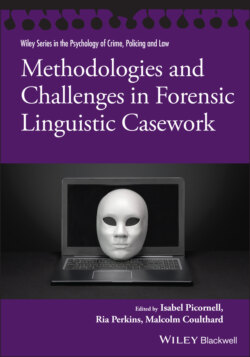Читать книгу Methodologies and Challenges in Forensic Linguistic Casework - Группа авторов - Страница 30
REFLECTION ON THE ATTEMPT TO MITIGATE BIAS
ОглавлениеThe design of our analysis in this case was a first for both of us. There are clear advantages in working as a pair with one forensic linguist adopting the role of “case manager” and the other as “analyst.” Both these roles require expertise and understanding of issues in authorship analysis work and, by separating out these functions, there is indeed an opportunity to mitigate some of the potential for unconscious bias in the analysis.
The first mitigating aspect of our procedure was the shielding of the analyst from the police briefing in the case. It would be foolish, however, to suggest that this created or could ever create a complete firewall in a case of disputed authorship. JG was fully aware that this was a serious missing person investigation and the emails in the known set, in and of themselves, told some of the story, as is always the case with textual data as opposed to other forms of forensic data. In addition, not only was JG exposed to some of the media reports about the case at the time, but the very fact of the police request for an authorship analysis was also a strong communication that the police believed that Jamie might be writing the disputed emails and possibly that harm had come to Debbie.
A more effective part of the strategy to mitigate bias was the restriction in the flow of text to JG as the analyst. Providing a descriptive, comparative analysis without sight of the disputed material, and locking that analysis before moving to examine the disputed material, strongly reduces the possibility of bias in feature selection. As discussed already, it does come at the cost of time and energy devoted to defining and investigating features that were simply not present in the disputed texts. It is our view that this is a cost worth bearing as the result is not only a more rigorous and certain analysis, but as such also an analysis that is harder to attack as a subjective view in an adversarial court system.
The issue of unconscious confirmation bias in all forms of forensic analysis is serious and present and entirely separate from that of an unscrupulous analyst who, regardless of which approach they take, can easily manipulate the results in the direction they choose. It is incumbent on all authorship analysts to consider how bias will affect their judgments and where and whether it can be designed out. A failure to recognize the risks here and a failure to take action to mitigate these risks is a failure of professionalism in our practice.
What we have reported here are just some possible ways to mitigate the risk of bias, and this separation between analyst and case manager along with a careful consideration of the order of analysis, has now been effectively applied to other cases. It is not always easy to do and there is no one correct method. Nonetheless, the approach in the Starbuck case shows how confirmation bias can be mitigated in authorship analysis and how the results can contribute positively to a case outcome. Risks of unconscious confirmation bias can be mitigated but perhaps never avoided altogether.
